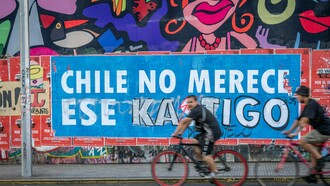وَقُل رَّبِّ أَدْخِلْنِي مُدْخَلَ صِدْقٍ وَأَخْرِجْنِي مُخْرَجَ صِدْقٍ وَاجْعَل لِّي مِن لَّدُنكَ سُلْطَانًا نَّصِيرًا. Translation: Say: "O my Lord! Let my entry be by the Gate of Truth and Honour, and likewise my exit by the Gate of Truth and Honour; and grant me from Thy Presence an authority to aid.
(Surah Al-Isra, Verse 80: Chapter 17 – Al-Isra)
This marvelous world is being turned into a planetary spittoon, which is seen by many as rain, while peace becomes more difficult to find—like a proverbial needle in a growing haystack.
When we say ‘we’ve lost our city’, we mean that a civilization has been destroyed.
(Doha Kahlout)
The situation is catastrophic. Bombings and killings occur daily. What matters most to me are the humanitarian, social, and living conditions of the people—especially older people—not the politics and warfare. Yet, the only solution to end this conflict is politics.
(Yehia Abed)
The saved treasures of Gaza
The Saved Treasures of Gaza will run through October 2025 at the Institut du Monde Arabe, Paris, to help remembrance by documenting culture erased by conflict. Visitors to this exhibition say that it preserves memory by bringing a millennia-old heritage to life, and that Gaza, destroyed many times, will rise again.
At the same time, the insights of Taqwa Ahmed Al-Wawi, a teenage writer, are disturbing. She says the human mind, faced with relentless pain, erects invisible barricades. Here, amid genocide, one of them is the ability to express trauma out loud.
“In Gaza,” she writes, “we are literally losing our ability to speak. Hope, once an expectation of a brighter future, is now a fragile flame struggling against the howling wind of despair. Safety has turned into an illusion, a fleeting shadow shattered by falling bombs or locked doors that cannot keep danger out. What we once called ‘normal’ has dissolved into a lost past, replaced by an unending rhythm of genocide. Home is no longer home.”1
As I write, ongoing deliberations may bring about an enduring ceasefire in Gaza and bring peace closer to the Middle East. Any peace is better than war—any port in a storm. Let peace prevail!
The earth is applauding approvingly as the hostages held by Hamas in Gaza are released. We wish them a great welcome home and hope that the peace provided for this to happen will have a long life. As we greet the homecoming of Jewish hostages and as Palestinians return home on the thirteenth (13th) of October 2025, a great landmark, a historical day is registered between war and peace, let’s not forget the many places where human beings and where humanity are still being humiliated, disrupted and displaced from civilized normal as a result of violent forces or as a result of the scarcity of resources. As we join in to the explosion of joy and jubilation, let’s remember the drama of the non-normal, one of isolation, demise, cruelty, and enforced hunger of 250 hostages suffering for two years in darkness, and the other, deprivation of decades of childhood in Gaza, the more than 70,000 dead and the recent starvation of its remaining population.
A collapsing health system
The emotional toll is overwhelming. Despite the dire circumstances, some remain resilient and committed to the health mission. They work in shelters to offer essential training on health issues and supply first aid kits to nurses and doctors. One of them is Yehia Abed, now Director of Operations for Juzoor, a non-governmental organization in Gaza.
Hunger and survival
Food scarcity has led to widespread malnutrition.
“I’m a living example,” says Dr. Abed. “I’ve lost 20 kilos since the war began. This isn’t about isolated cases of starvation; the entire population of Gaza is affected. Fresh vegetables or meat haven’t been seen in months, and food prices have skyrocketed. We haven’t seen a single food truck for a long time. The impact of malnutrition on older people is severe, and their chances of recovery are very low.”
Now 75 years old, Yehia has witnessed more than 20 wars, but he has never seen anything as bad as the current situation. The ongoing conflict has devastated every aspect of life and has left older people among the most vulnerable.
“We always treated our parents and grandparents with ultimate respect; good food and comfort were prioritized for them. Now, that aspect has had to be overlooked due to food scarcity and widespread destruction of homes. Older people prefer to give their food to children. They want peace and security for their children, not for themselves.”
It is extremely difficult to follow through the stomach or take in by the mind this reality in real time, to witness daily killings, the demise of the sick and wounded deprived of medical care, the weak locked in poverty who cannot survive in the new poverty conditions, and those who are bound to reach starvation. Maternal, newborn, and child health services have all been destroyed. Since October 2023, more than 1,700 health workers have been killed, the health care system has collapsed, and the entire population in Gaza lives in poverty. While leaders take pride in their peace proposal negotiations and peace diplomacy, there is too little of it, and this dilutes the strength of the UN’s call to end the vicious circle of bloodshed. In reference to Gaza, Guterres has said António Guterres has said and recently: “Violence does not come in a vacuum—it grows out of a long-standing conflict. It comes with a 56-year-long occupation and with no political end in sight.”
A humanitarian collapse
While leaders take pride in their peace proposal negotiations and diplomacy, there is too little of it, and this dilutes the strength of the UN’s call to end the vicious circle of bloodshed. Senseless, violent events and deliberate actions intended to cause pain, death, or prevent the arrival of help are vicious enablers—they escalate hatred and desensitize us to shock.
Life in the Gaza Strip today is unsustainable. Not one of its systems has any reserve capacity. Overcrowding, poor sanitation, bombed-out dwellings, rubble, and dust have led to the spread of infectious diseases—diarrheal, respiratory, and skin infections. The breakdown of healthcare, water, and sanitation infrastructure has worsened the threat of cholera, typhoid, and tuberculosis. Malnutrition is widespread, famine threatens, which now in postwar will need careful management.
Memories of public health
Public health took me to Gaza, the West Bank, and Israel. My activities were supported by the Greek Ministry of Health from the 1990s. My hosts and guides were mainly international experts from the health sector, and on occasion, close friends and colleagues from the UK and America.
My close colleagues included an internationally known public health expert and a neurophysiologist. Traveling companions were staff and students from the Athens School of Public Health, colleagues from ASPHER ASPHER (schools/institutes in public health),, and Ulrich Laser, a distinguished German scholar from the University of Bielefeld, who spearheaded a significant aid program to Gaza.
We engaged in public health school development projects, delivered seminars, and printed the Acropolis Memorandum (1995) on Public Health in Palestine.
I record these memories before they fade, hoping they may prove useful.
Encounters and reflections
Unforgettable moments include:
Expert discussions on child development and maintaining public health functions in conflict.
Focused seminars and curricula on disaster management and public health.
Visits to Jerusalem and the West Bank with Michael Davis from Manchester.
Tours to view the Dead Sea Scrolls and Chagall’s stained glass.
The ASPHER 50th anniversary hosted in Athens in 2016, following my initial bid in Zagreb.
Three lasting images:
A day in the home of our Palestinian host Yehia and director of public health in Gaza with Ulrich—good food, rich conversation, and cultural warmth.
A wave of animated schoolchildren in dark blue uniforms flooding a mud-paved road on there way home from school.
Crossing “no man’s land” between Gaza and Israel—through the tunnel for Palestinians—being vigorously questioned in Tel Aviv due to the mistaken identity with a terrorist of my student with me on the mission.
Tributes and correspondence
Jeffrey Levett has made a profound impact on public health education and practice, both globally and through his contributions to the Faculty of Public Health at Al-Quds University. He helped establish its Faculty of Public Health in the 1990s, laying the foundation for Palestine’s first national multidisciplinary institution.
He also served as founding Dean of the National School of Public Health in Athens and as President of ASPHER, linking public health to peace and human rights—earning recognition such as the Gusi Peace Prize in Asia..
Motasem Hamdan wrote:
I met Professor Levett when he visited the newly founded School of Public Health at Al-Quds University in 1998, which his school in Athens helped to establish... In 2016, Athens hosted ASPHER’s 50th anniversar which put forward the Athens ASPHER Accord.. . We thoroughly enjoyed the event and the tour of the Acropolis Museum. Professor Levett, thank you for your dedication to developing public health leadership in Europe and beyond, and for being a true friend of Palestine.
Letters from Gaza and Jerusalem
Dear Professor Jeffrey,
Greetings from Gaza. We are still safe in the north. I remember every minute in Greece, Jerusalem, and the Gaza Strip... Tell Dr. Lucas that I was keeping his gift, a book about Greece till January when all my library was bombed . All Jabalia was destroyed over a wide area. Ceasefire is fragile, but we continue to work hard. Our School of Public Health is still functioning and growing. I hope peace is coming, and surely we will meet again.
(Yehia)
And from Khuloud, Dear Colleagues, greetings from the West Bank, Jerusalem. Yes, prof. Jeffrey Levett is a great colleague and friend to us and to our school of public health since we founded it! He hosted Prof. Yehia Abed and myself in Athens at their National School of public health and he has visited our School in AlBireh Campus! We appreciate his role since 30 years and more. Prof Abed was at the Acropolis meeting in 1994, when everything started as he told me. Bless you Dr Yehia for all your blessed efforts our Public Health God Father in Palestine. Bless you Dr Jeffrey for all your blessed efforts for decades, with the hope that we will have another opportunity to meet here or there (also with Prof Yehia and Dr Hazem). Bless you Dr Hazem for all your blessed efforts dedicated to take our special School of Public Health to new horizons especially with our PhD program and others.
My very best wishes and kindest regards. Sincerely yours, Well done work and great efforts We had many activities together in Palestine and Greece pertaining to school development, capacity building, programs improvement, conducting lectures and brain storming with faculty members (now: Dr Motasem , Drs Nuha and Khaldun) regarding cooperation and public health issues; historical and contemporary aspects.
(Al-Quds University Faculty)
Dear Khuloud, Yehia, and Hazem,
I thank you for your messages and your remembrances of interesting but difficult days. Any information you may have—meeting agendas, photos, or the Acropolis Memorandum—would be useful... Ramadan and Lent are times to reflect, contemplate, and celebrate. Even now in Gaza, where the worst humanitarian crisis of our time is ongoing, we must hope. Be well.
(Jeffrey Levett)
Shared endeavors
Collaborations between the Palestinian Ministry of Health, Al-Quds University, University of Bielefeld, and the National School of Public Health (Greece) in 1997 produced key symposia:
Prospects for Health Care in the Gaza Strip and Jericho District (Al-Quds).
Public Health in Palestine and Health Systems Design (Athens).
The exhibition: rescued treasures from Gaza
The exhibition Rescued Treasures from Gaza: 5000 Years of History at the Arab World Institute in Paris continues to celebrate Palestinian and Eastern heritage, preserving rare artifacts from extinction. These treasures are safe in exile—miraculously saved from destruction. They reveal Gaza’s ancient identity as a flourishing crossroads of civilizations and trade.
One section, Patrimony in Peril, contains no artifacts—only photographic documentation conveying the scale of devastation and loss of Gaza’s archaeological and cultural heritage.
Reflections on war and peace
To the leadership of Israel, I say: it was an outrageous and saddening act when Hamas attacked Israel, killing innocent civilians and took 240 hostages—with too many of them now dead, while the survivors endured immense suffering. Yet, the disproportionate military response has killed thousands of Palestinians, leaving survivors facing famine. To Israel again I say: let your reasonableness be known to everyone.
It will be difficult to forgive. It will be harder to forget. Recovery will require time—and public health will play an essential role in rebuilding life and hope.
Let us welcome a reluctant ceasefire and a shaky peace.
Two years after the killings by Hamas, the world still bleeds. Surviving Jewish hostages are going home; Gaza has been obliterated; Palestinians are displaced and still starving. Decades of children have grown up knowing only violence. Palestinians are still displaced and starving. Decades of children have grown up knowing only violence.
Rebuilding Gaza—perhaps one day as a place of peace—will demand imagination, willpower, and justice.We can guestimate the business opportunities and the enormous cost of rebuilding Gaza as a tourist paradise on top of all the painful voices emanating from the ground and we can intuit the set of difficulties that will be encountered between the unfreezing of the current problem space of dying hostages and a ceasefire that will be monitored through a treaty managed transition hopefully through the international community and then a refreezing in a state of peace protected within a legal framework. What is not so predictable includes a total disarmament by Hamas, the degree of change in the destructive spheres of two different mindsets and how remembrance will be managed by ordinary people.
As we give thanks that hostilities, have ceasd, which could and should have ended sooner I continue to hold my breath.
Note: Juzoor for Health and Social Development is a Palestinian non-governmental organization and member of the HelpAge global network. It works nationally to improve the health and well-being of Palestinian families and to promote health as a basic human right.
Notes
1 Dr Khuloud J. Khayyat Dajani and Founding Dean of Public Health School is noted for her contributions to community health and visual handicap, Professor Yehia is a living hero of Gaza, Professors Hazem Agha and Motasem Hamdan former and present Deans of the School of Public Health, AlQuds University Al Quds and ambassadors for public health and Ulrich Laaser is the President of all things public health.















